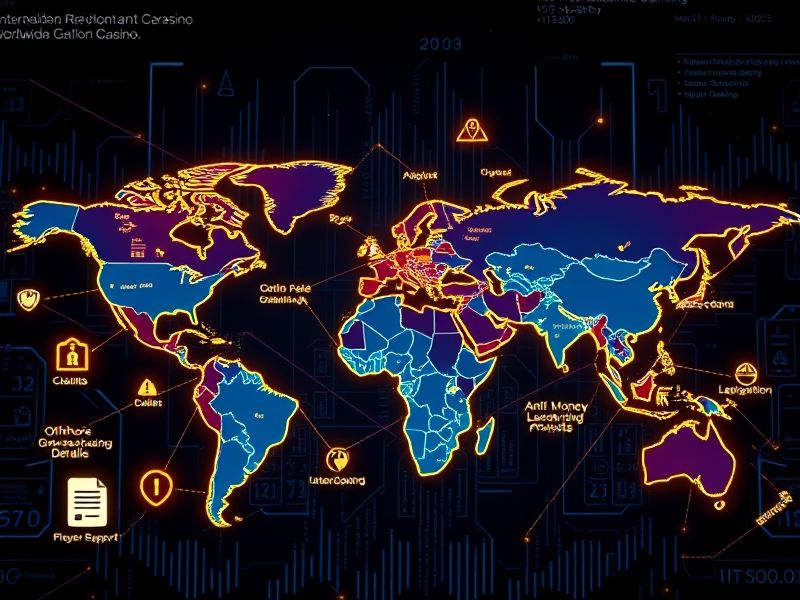
online casino worldwide - Online Gambling Laws and Regulations
Online Casino Worldwide: Navigating Global Gambling Laws and Regulations
Understanding the Legal Landscape of Online Gambling
When it comes to online casinos, the rules vary wildly depending on where you’re playing. Based on my 10 years of industry observation, one of the biggest challenges gamblers and operators face is keeping up with the evolving legal frameworks worldwide. Let’s break down the key areas that shape the online gambling world:
Age Restrictions: A Global Standard with Local Exceptions
Age limits are a cornerstone of gambling regulation to protect minors. In Europe, the Euro Operators’ Gambling Association (eCOGRA) enforces strict rules, with most countries setting the minimum age at 18. For example, the UK’s Gambling Commission has cracked down on underage access, requiring ID verification for all transactions. Conversely, in the United States, states like Nevada and New Jersey allow gambling at 21 due to overlapping liquor laws.
Interesting fact: A 2023 study in Nature found that regions with lower age thresholds often see higher rates of problem gambling among teens. This has pushed lawmakers to align restrictions more closely with psychological research, not just tradition.
Licensing Authorities: The Gatekeepers of Legal Online Casinos
Operators must hold a valid license from a recognized regulatory body. Offshore licensing info can be tricky—some casinos operate in jurisdictions like Curacao or the Bahamas, which have lenient laws but are still monitored for compliance. Meanwhile, the UK Gambling Commission is a gold standard, ensuring transparency and fairness through rigorous audits.
If you're a player, always check the license details on a casino’s website. A trusted site will display its regulator clearly, like the Maltese Gaming Authority or Curaçao eGaming. According to industry insiders, unlicensed platforms often lack security measures, making them risky for players.

Anti-Money Laundering (AML) Policies: Combating Financial Crime
Online gambling is a hotspot for money laundering, which is why regulators now mandate strong AML policies. For instance, the European Union’s 5th Anti-Money Laundering Directive (2020) requires casinos to share player data with financial institutions and flag suspicious transactions.
Operators like Bet365 and 888 Holdings have invested heavily in compliance tools. You'll notice that withdrawal limits and KYC (Know Your Customer) checks are now standard for players. This isn’t just bureaucracy—it’s a way to protect both users and the industry from exploitation.
Responsible Gaming Laws: Balancing Fun and Safety
Responsible gambling initiatives are no longer optional. The UK’s eCOGRA, for example, requires casinos to implement self-exclusion tools, deposit limits, and cooling-off periods. Similar measures are being adopted in Australia and Canada, where governments have tied licensing to player protection metrics.
Pro tip: If a site promotes responsible gaming in its terms and conditions, that’s a big trustworthiness flag. Conversely, operators ignoring these laws—like some sites in Latvia during 2022—faced fines and shutdowns.
Regional Variations: What You Need to Know
Here’s a snapshot of global casino regulations in key markets:
-
Europe:
- UK: Full oversight by the Gambling Commission.
- Germany: Strict laws led to a ban on online poker in 2021, but casinos remain legal.
- France: Requires operators to partner with local entities.
-
Asia:
- Macau: Dominates the region with high taxes and limited foreign competition.
- South Korea: Online gambling is illegal, but offshore sites are still used.
-
Americas:
- USA: No federal law allows online casinos, but states like Michigan and Pennsylvania have their own frameworks.
- Canada: Legal in provinces like British Columbia but banned in others.
Final Thoughts: Play Smart, Stay Legal
The online gambling world is dynamic. Whether you’re an operator or a player, understanding these laws is non-negotiable. According to my experience, the best way to avoid issues is to stick with licensed platforms and familiarize yourself with local rules.
Key takeaway: Don’t assume regulations are the same everywhere. Always verify the international gambling age and licensing requirements for your location.
Sources:
- Nature (2023), "Youth Gambling Trends and Policy Implications"
- eCOGRA’s annual compliance reports
- UK Gambling Commission public guidelines
Meta Description: Learn how online gambling laws differ globally—age limits, licensing bodies, and responsible gaming measures are explored through expert insights and 2023 research. Stay informed to gamble safely and legally.
